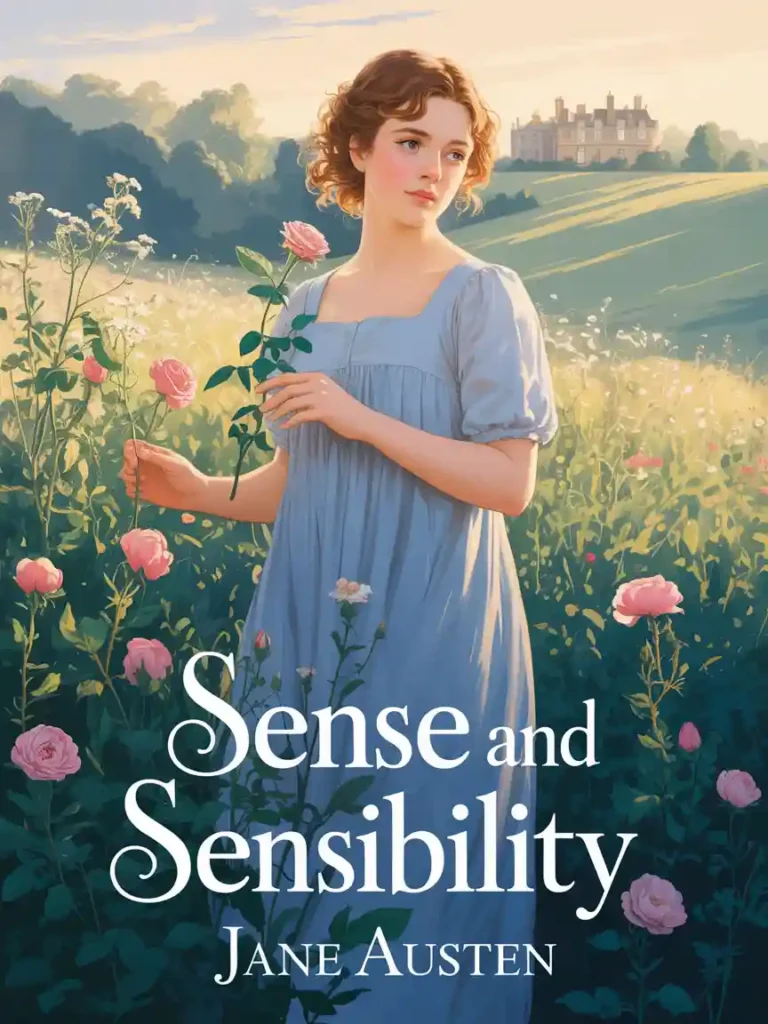CHAPTER X.
Marianne’s preserver, as Margaret, with more elegance than precision,
styled Willoughby, called at the cottage early the next morning to make his
personal enquiries. He was received by Mrs. Dashwood with more than
politeness; with a kindness which Sir John’s account of him and her own
gratitude prompted; and every thing that passed during the visit tended to
assure him of the sense, elegance, mutual affection, and domestic comfort
of the family to whom accident had now introduced him. Of their personal
charms he had not required a second interview to be convinced.
Miss Dashwood had a delicate complexion, regular features, and a
remarkably pretty figure. Marianne was still handsomer. Her form, though
not so correct as her sister’s, in having the advantage of height, was more
striking; and her face was so lovely, that when in the common cant of
praise, she was called a beautiful girl, truth was less violently outraged than
usually happens. Her skin was very brown, but, from its transparency, her
complexion was uncommonly brilliant; her features were all good; her
smile was sweet and attractive; and in her eyes, which were very dark, there
was a life, a spirit, an eagerness, which could hardly be seen without
delight. From Willoughby their expression was at first held back, by the
embarrassment which the remembrance of his assistance created. But when
this passed away, when her spirits became collected, when she saw that to
the perfect good-breeding of the gentleman, he united frankness and
vivacity, and above all, when she heard him declare, that of music and
dancing he was passionately fond, she gave him such a look of approbation
as secured the largest share of his discourse to herself for the rest of his stay.
It was only necessary to mention any favourite amusement to engage her
to talk. She could not be silent when such points were introduced, and she
had neither shyness nor reserve in their discussion. They speedily
discovered that their enjoyment of dancing and music was mutual, and that
it arose from a general conformity of judgment in all that related to either.
Encouraged by this to a further examination of his opinions, she proceeded
to question him on the subject of books; her favourite authors were brought
forward and dwelt upon with so rapturous a delight, that any young man of
five and twenty must have been insensible indeed, not to become an
immediate convert to the excellence of such works, however disregarded
before. Their taste was strikingly alike. The same books, the same passages
were idolized by each—or if any difference appeared, any objection arose,
it lasted no longer than till the force of her arguments and the brightness of
her eyes could be displayed. He acquiesced in all her decisions, caught all
her enthusiasm; and long before his visit concluded, they conversed with
the familiarity of a long-established acquaintance.
“Well, Marianne,” said Elinor, as soon as he had left them, “for one
morning I think you have done pretty well. You have already ascertained
Mr. Willoughby’s opinion in almost every matter of importance. You know
what he thinks of Cowper and Scott; you are certain of his estimating their
beauties as he ought, and you have received every assurance of his admiring
Pope no more than is proper. But how is your acquaintance to be long
supported, under such extraordinary despatch of every subject for
discourse? You will soon have exhausted each favourite topic. Another
meeting will suffice to explain his sentiments on picturesque beauty, and
second marriages, and then you can have nothing farther to ask.”
“Elinor,” cried Marianne, “is this fair? is this just? are my ideas so
scanty? But I see what you mean. I have been too much at my ease, too
happy, too frank. I have erred against every common-place notion of
decorum; I have been open and sincere where I ought to have been
reserved, spiritless, dull, and deceitful—had I talked only of the weather
and the roads, and had I spoken only once in ten minutes, this reproach
would have been spared.”
“My love,” said her mother, “you must not be offended with Elinor—she
was only in jest. I should scold her myself, if she were capable of wishing
to check the delight of your conversation with our new friend.” Marianne
was softened in a moment.
Willoughby, on his side, gave every proof of his pleasure in their
acquaintance, which an evident wish of improving it could offer. He came
to them every day. To enquire after Marianne was at first his excuse; but the
encouragement of his reception, to which every day gave greater kindness,
made such an excuse unnecessary before it had ceased to be possible, by
Marianne’s perfect recovery. She was confined for some days to the house;
but never had any confinement been less irksome. Willoughby was a young
man of good abilities, quick imagination, lively spirits, and open,
affectionate manners. He was exactly formed to engage Marianne’s heart,
for with all this, he joined not only a captivating person, but a natural
ardour of mind which was now roused and increased by the example of her
own, and which recommended him to her affection beyond every thing else.
His society became gradually her most exquisite enjoyment. They read,
they talked, they sang together; his musical talents were considerable; and
he read with all the sensibility and spirit which Edward had unfortunately
wanted.
In Mrs. Dashwood’s estimation he was as faultless as in Marianne’s; and
Elinor saw nothing to censure in him but a propensity, in which he strongly
resembled and peculiarly delighted her sister, of saying too much what he
thought on every occasion, without attention to persons or circumstances. In
hastily forming and giving his opinion of other people, in sacrificing
general politeness to the enjoyment of undivided attention where his heart
was engaged, and in slighting too easily the forms of worldly propriety, he
displayed a want of caution which Elinor could not approve, in spite of all
that he and Marianne could say in its support.
Marianne began now to perceive that the desperation which had seized
her at sixteen and a half, of ever seeing a man who could satisfy her ideas of
perfection, had been rash and unjustifiable. Willoughby was all that her
fancy had delineated in that unhappy hour and in every brighter period, as
capable of attaching her; and his behaviour declared his wishes to be in that
respect as earnest, as his abilities were strong.
Her mother too, in whose mind not one speculative thought of their
marriage had been raised, by his prospect of riches, was led before the end
of a week to hope and expect it; and secretly to congratulate herself on
having gained two such sons-in-law as Edward and Willoughby.
Colonel Brandon’s partiality for Marianne, which had so early been
discovered by his friends, now first became perceptible to Elinor, when it
ceased to be noticed by them. Their attention and wit were drawn off to his
more fortunate rival; and the raillery which the other had incurred before
any partiality arose, was removed when his feelings began really to call for
the ridicule so justly annexed to sensibility. Elinor was obliged, though
unwillingly, to believe that the sentiments which Mrs. Jennings had
assigned him for her own satisfaction, were now actually excited by her
sister; and that however a general resemblance of disposition between the
parties might forward the affection of Mr. Willoughby, an equally striking
opposition of character was no hindrance to the regard of Colonel Brandon.
She saw it with concern; for what could a silent man of five and thirty hope,
when opposed to a very lively one of five and twenty? and as she could not
even wish him successful, she heartily wished him indifferent. She liked
him—in spite of his gravity and reserve, she beheld in him an object of
interest. His manners, though serious, were mild; and his reserve appeared
rather the result of some oppression of spirits than of any natural
gloominess of temper. Sir John had dropped hints of past injuries and
disappointments, which justified her belief of his being an unfortunate man,
and she regarded him with respect and compassion.
Perhaps she pitied and esteemed him the more because he was slighted
by Willoughby and Marianne, who, prejudiced against him for being neither
lively nor young, seemed resolved to undervalue his merits.
“Brandon is just the kind of man,” said Willoughby one day, when they
were talking of him together, “whom every body speaks well of, and
nobody cares about; whom all are delighted to see, and nobody remembers
to talk to.”
“That is exactly what I think of him,” cried Marianne.
“Do not boast of it, however,” said Elinor, “for it is injustice in both of
you. He is highly esteemed by all the family at the park, and I never see him
myself without taking pains to converse with him.”
“That he is patronised by you,” replied Willoughby, “is certainly in his
favour; but as for the esteem of the others, it is a reproach in itself. Who
would submit to the indignity of being approved by such a woman as Lady
Middleton and Mrs. Jennings, that could command the indifference of any
body else?”
“But perhaps the abuse of such people as yourself and Marianne will
make amends for the regard of Lady Middleton and her mother. If their
praise is censure, your censure may be praise, for they are not more
undiscerning, than you are prejudiced and unjust.”
“In defence of your protégé you can even be saucy.”
“My protégé, as you call him, is a sensible man; and sense will always
have attractions for me. Yes, Marianne, even in a man between thirty and
forty. He has seen a great deal of the world; has been abroad, has read, and
has a thinking mind. I have found him capable of giving me much
information on various subjects; and he has always answered my inquiries
with readiness of good-breeding and good nature.”
“That is to say,” cried Marianne contemptuously, “he has told you, that in
the East Indies the climate is hot, and the mosquitoes are troublesome.”
“He would have told me so, I doubt not, had I made any such inquiries,
but they happened to be points on which I had been previously informed.”
“Perhaps,” said Willoughby, “his observations may have extended to the
existence of nabobs, gold mohrs, and palanquins.”
“I may venture to say that his observations have stretched much further
than your candour. But why should you dislike him?”
“I do not dislike him. I consider him, on the contrary, as a very
respectable man, who has every body’s good word, and nobody’s notice;
who has more money than he can spend, more time than he knows how to
employ, and two new coats every year.”
“Add to which,” cried Marianne, “that he has neither genius, taste, nor
spirit. That his understanding has no brilliancy, his feelings no ardour, and
his voice no expression.”
“You decide on his imperfections so much in the mass,” replied Elinor,
“and so much on the strength of your own imagination, that the
commendation I am able to give of him is comparatively cold and insipid. I
can only pronounce him to be a sensible man, well-bred, well-informed, of
gentle address, and, I believe, possessing an amiable heart.”
“Miss Dashwood,” cried Willoughby, “you are now using me unkindly.
You are endeavouring to disarm me by reason, and to convince me against
my will. But it will not do. You shall find me as stubborn as you can be
artful. I have three unanswerable reasons for disliking Colonel Brandon; he
threatened me with rain when I wanted it to be fine; he has found fault with
the hanging of my curricle, and I cannot persuade him to buy my brown
mare. If it will be any satisfaction to you, however, to be told, that I believe
his character to be in other respects irreproachable, I am ready to confess it.
And in return for an acknowledgment, which must give me some pain, you
cannot deny me the privilege of disliking him as much as ever.”





